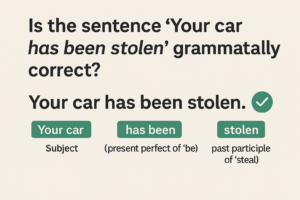Is the Sentence “Your Car Has Been Stolen” Grammatically Correct?-Grammar Puzzle Solved (7)
English learners often ask, “Is the sentence ‘Your car has been stolen’ grammatically correct?” The answer is yes. The sentence represents the present perfect passive tense, and English speakers use this form regularly. Learners who study this tense and practice it consistently improve both fluency and accuracy in communication.
The sentence “Your car has been stolen” follows the standard pattern of the present perfect passive: Subject + has/have been + past participle. In this case, “your car” acts as the subject. The phrase “has been” marks the present perfect form of be, and “stolen” functions as the past participle of steal. Together, these words form a complete passive structure. The car is gone, and the sentence focuses on the missing object rather than the thief. English speakers use this form to emphasize consequences. When the exact time of the event carries little weight, this tense works perfectly.
Now compare the passive with the active version: “Someone has stolen your car.” The active sentence directs attention to the thief, while the passive stresses the car. Writers and speakers often choose passive in crime reports, accident updates, or news stories because these contexts focus on results.
Consider another example: “My phone has been lost.” This passive construction emphasizes the result rather than the person responsible. In daily conversations, speakers often prefer active expressions. For instance, they say, “I lost my phone” when admitting responsibility. They also say, “Someone took my phone” when suggesting another person caused the loss. Both sentences give clear meaning and direct focus. However, each sentence directs attention differently. Active voice identifies the doer and strengthens responsibility. Passive voice highlights the effect or situation itself. Learners should study both forms carefully. They should practice with personal examples to strengthen understanding. They should compare meanings and evaluate contexts where one feels more natural. With steady practice, they gain confidence. With clear attention, they build accuracy. Finally, they apply both voices correctly in writing and speaking.
Learners often struggle with this tense because their first language does not rely on such structures. However, regular practice builds confidence and skill. Read police reports to see how officers describe recent events. Follow workplace announcements where managers emphasize tasks they have completed. Observe company updates where teams highlight progress and achievements. Study academic texts in which researchers present results that connect past work with current understanding. Explore news articles that explain outcomes of recent decisions or discoveries. Notice how teachers guide students to apply past knowledge in present tasks. Writers consistently use this tense to link action with consequence. Each example shows how present perfect highlights results in daily communication. Learners who engage with authentic material strengthen understanding quickly. Through consistent practice, anyone can master this tense effectively.

She has been OR She was:
The Knight in The General Prologue:
https://englishlitnotes.com/2025/05/23/the-knight-in-general-prologue/
Sir Alexander Fleming by Patrick Pringle:
https://englishwithnaeemullahbutt.com/2025/06/02/alexander-fleming/
Edgar Allan Poe: https://americanlit.englishlitnotes.com/life-and-legacy-of-edgar-allan-poe/
Visit ChatGPT to explore the platform and interact with the AI: https://chat.openai.com
Discover more from Grammar Puzzle Solved by Naeem Ullah Butt
Subscribe to get the latest posts sent to your email.